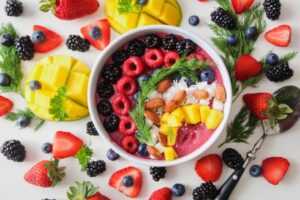There are no specific diet plans for IBS patients. It’s always specific for each patient as some food items may suit others but may cause some problems when you take them. All you need to do is just make a food diary of whatever you take and notice the impact on your body.
Make some changes in your diet plan and observe its effects for several weeks whether it improves your condition, stabilizes your condition, or makes it worse. Figuring out the triggering food items is the most important task for IBS patients.
What are the 7 best foods that help IBS go away?
The best foods are the ones that improve your digestion and manage your abdominal cramps, constipation, and diarrhea.
Fatty fish
Omega-3 fatty acids are the greatest to manage your IBS-related symptoms as they reduce inflammatory conditions. These include Sardines, Rainbow Trouts, Tuna, Salmon, Herring, Whitefish, Black cod, Anchovies
Lean meats
Lean meats are a great source of protein and are easily digestible also. It doesn’t aggravate your condition. There is enough protein present in lean meats. While fatty meat can cause inflammation in the GIT. The lean meat includes:
- White chicken
- Pork
- White meat turkey
- Lean cuts of beef
Avoid dark meat chicken or turkey and marbled beef cuts that contain fats or toxins that cause inflammation in the body.
Eggs
An egg is the standard protein and is easy to digest. However, eggs are not good for each patient. You need to check this item by adding it to the food diary and observing your gut response to them.
Probiotics
There are two types of bacteria: Lactobacillus and Bifidobacterium along with one good yeast in probiotics – Saccharomyces boulardii. They help in managing IBS by balancing the good bacteria in the gut. They help in fighting inflammation and heal the gut wall. A good source of probiotics is yogurt and fermented foods like kimchi, tempeh, and kombucha. Choose probiotics according to your symptoms and in the required amount.
Vegetables
Low-FODMAP vegetables are healthy for gut flora and good for IBS symptoms. These include green beans, bean sprouts, carrots, cucumber, eggplant, zucchini, sweet potato, spinach, yam, squash, lettuce, potato, and turnips.
Bone broth
It contains many nutrients which are healthy for gut flora and the intestinal lining. Bone broth is made up of animal bones which are used in human diets.
Whole grains
They do not benefit IBS patients much but also do not flare up the condition. They add bulk to the diet and make the food travel easy in the gut. It keeps the intestine healthy. Sometimes they can soothe your symptoms. They also lower cholesterol and blood pressure thus keeping the heart healthy.
Gluten-free oatmeal, brown rice or brown bread are well-perceived by the patients. Avoid consuming whole wheat flour like pasta, and bread as it can cause bloating, constipation, diarrhea or abdominal cramps.
What are the worst foods that trigger IBS flare-ups?
You have to avoid those foods that aggravate your bloating, cramps, constipation, or diarrhea. Some of the common triggering foods are:
High FODMAPs food
As discussed earlier high FODMAP foods are unhealthy and difficult to digest by the intestines, especially for IBS patients. The high FODMAPs food includes:
- Corns
- Green beans
- Carrots
- Potato
- Sweet potato
- Tomato
- Turnip
- Lettuce
- Baby spinach
- Avocado
- Berries
- Kiwi
- Banana
- Grapes
- Pineapples
- Almonds
- Hazelnuts
- Pecans
- Brazil nuts
Dairy products
Avoid items like cheese, creams, and other dairy products containing lactose like milk. Lactose becomes difficult to digest and causes diarrhea and other symptoms.
Cruciform vegetables
These vegetables contain a specific sugar called raffinose which remains in the gut for a long time and takes time to get absorbed by the gut. It requires a high amount of good gut bacteria to ferment this sugar thus it causes bloating, constipation, and abdominal cramps when it remains longer in the stomach. The cruciform vegetables include:
- Cauliflower
- Cabbage
- Broccoli
- Bok choy
- Brussels
- Asparagus
- Sprouts
- Sweet potato
Beans
Beans are also a good source of protein and rich in fibers, but they contain oligosaccharides which are difficult to digest for the gut. So, they may act as triggering factors for IBS patients. These include:
- Lentils
- Soybeans
- Black
- Navu
- White
- Kidney
Fried food/Greasy food
Fried food becomes difficult to digest due to the high amount of unhealthy oil, and fat in it. It might pass through the GIT undigested and result in diarrhea. It includes:
- Chicken
- French fries
- Cakes
- Donuts
- Egg rolls
Spicy food
Avoid having red chilies in your food or spicy food as it may irritate the mucosal lining of the intestine and can cause abdominal cramps.
Caffeine
Avoid having tea, coffee, and chocolate as they can cause diarrhea especially when taken on an empty stomach. You can go for alternative drinks like green tea, and white tea which are low in caffeine.
Alcohol
Alcohol can worsen your IBS due to the high amount of sugar in it. Most commonly beer contains gluten which is found in wheat also and causes diarrhea and bloating in IBS patients. It also contributes to constipation by causing dehydration. Even if you take alcohol occasionally take care of the amount of sugar and drink plenty of water to prevent dehydration.
Processed food
Processed food contains high amounts of sugar, salt, and fat to add flavor. Some good examples are:
- Chips
- Soft drinks
- Cheese
- Frozen meals
- Microwave or ready meals
- Frozen meat like bacon, sausage, salami
Garlic and Onions
Garlic and onions are also difficult to break down by the intestines and thus may cause gastric accumulation or bloating and abdominal cramps in IBS.
For more information, you can visit Healthline and Mayoclinic.






